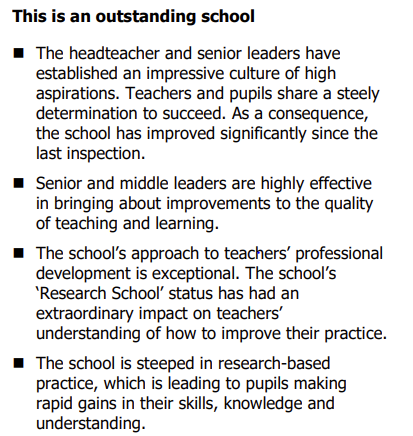There is a lot of publicity about the DfE’s declaration that schools must be open for 32.5 hours a week. Accepting that most schools are already open for longer than 32.5 hours a week, what the DfE need to realise is that the impact of teaching time upon students’ learning depends upon quality not duration.
In 2010 we decided to send our students home an hour early on alternate Mondays, so that we could have two hours every fortnight for staff training, in addition to our five annual training days. This reduced the contact time with students to 24.5 hours a week on average, below the 25 hours recommended by the DfE. When things were really tough I took seven training days a year, but just didn’t tell anyone.
In November 2017 Huntington was graded Outstanding by Ofsted. There was particular praise for our evidence-informed professional development:

Between 2010 and 2018 our students’ results – arguably the most important measure of the impact of our teaching – improved inexorably. In 2018 we had one of those years when every single subject’s results at GCSE and A Level “came in”, and it was that cohort of students who had less, but far better, contact time with their teachers for the duration of their Huntington School careers. To give you a sense of how good the results were, the average GCSE points score (APS) in 2018 was better than the 2021 TAGs equivalent. And for the first time we were awarded an ALPS grade 1 at A Level.
It is the quality of the time spent with teachers that matters most to students’ learning, not the amount of contact time. If the DfE were serious about helping improve the quality of teaching in our schools, they would be wise to acknowledge that ring-fenced time for evidence-informed training of teachers is the secret to improving students’ outcomes, and their policies would reflect that truth.
